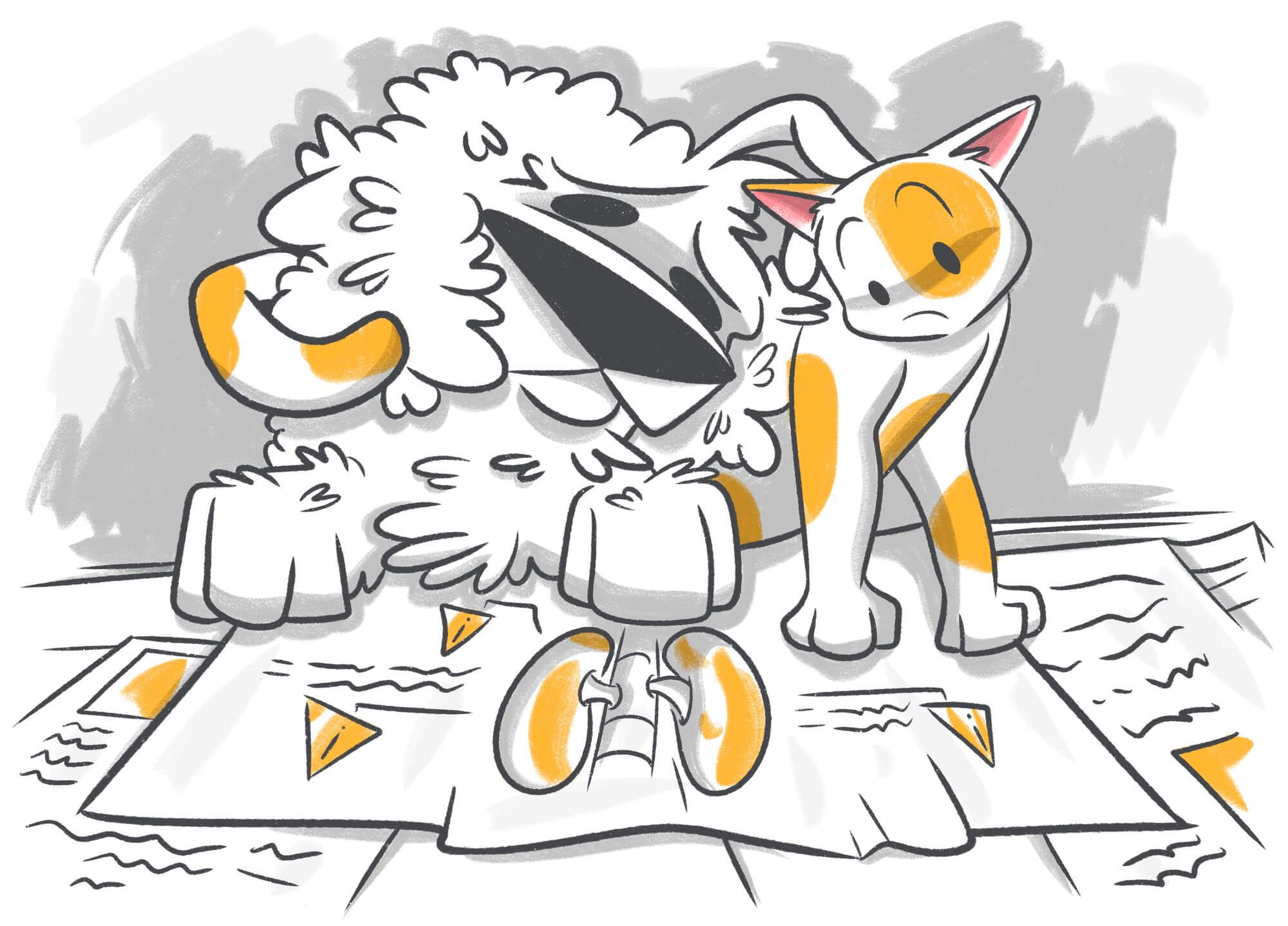Kidneys are important for dogs, humans, cats, and plenty of other animals. They keep bodies healthy by getting rid of any potentially toxic stuff, keeping blood pressure stable, working with other vitamins and minerals for faster and more efficient absorption, and more. As you can probably imagine, when a dog suffers from kidney problems, all sorts of things seem to go ‘haywire’.
Stop Googling - Ask a Real Vet
Let’s take a look at kidney problems in dogs, what you can do about them, and when you need to worry.
Content:
- Symptoms of Kidney Problems in Dogs
- Causes of Kidney Issues in Dogs
- Treatment for Kidney Problems in Dogs
- Dog Treats for Kidney Disease
- FAQ
Symptoms of Kidney Problems in Dogs
There are several different kidney problems, each of which has its common symptoms and signs.
Dog kidney infection symptoms can take a long time to materialize because it takes the bacteria a while to get to work. This means that obvious symptoms can be a sign of a later stage of the medical problem.
Common signs of kidney infection in dogs are:
- Drinking more than usual;
- Unusually smelling urine;
- Urinating more than usual and/or for longer;
- Food avoidance;
- Vomiting;
- Itching skin;
- Struggling to urinate due to pain;
- Unusually high levels of tiredness;
- Mobility or pain issues with the back;
- Losing weight.
Kidney failure in dogs comes with many of the same symptoms and can also cause oral issues such as discolored or pale gums, mouth ulcers, diarrhea, and vomiting.
Blood in the urine is a vague sign of kidney issues and could be related to kidney stones as well as infections and failure. Bad-smelling breath is a relatively common sign of kidney dysplasia, on top of the symptoms already mentioned.
Causes of Kidney Issues in Dogs
Studies suggest that certain breeds of dogs are more predisposed to kidney problems, also known as renal problems. German shepherds, bull terriers, and cocker spaniels are higher-risk breeds, and senior dogs are diagnosed much more frequently with renal failure or severe renal issues than their younger counterparts. Renal disease can also be genetic, passed down from generation to generation.
Other causes of dog kidney problems include environmental factors such as drugs (medications), foods that aren’t dog-safe, chemicals found in household cleaning products, and even other infections within the body.
Kidney Problems in Dogs
When a dog presents to the vet with problems that seem to relate to the kidneys, there are several root causes. The symptoms of them all are very similar, which means that they can’t be diagnosed with a list of symptoms alone. Alongside urine, stool, and blood tests, your vet may perform other diagnostic testing to get to the root of the problem.
Dog Kidney Infection
Kidney infections in dogs are known medically as pyelonephritis, and according to Cornell University College of Veterinary Medicine study, they are more commonly diagnosed in dogs that are middle-aged or senior.
It’s important to get a kidney infection diagnosed and treated as soon as possible, not just in dogs but also in other animals — and even humans! Without treatment, kidney infections can get more severe, and bacteria from the infection can travel elsewhere in the body. When it enters the bloodstream, the outcome can be deadly in a very short period.
Dog Kidney Failure
When the kidneys have become so damaged that they can no longer function optimally, it is known as kidney failure or renal failure. This can be chronic — gradual and over time, or it can be acute — a sudden occurrence. Chronic cases can be minor and/or mild (stage one) or severe and essentially terminal (stage four).
Untreated infections and other kidney-related conditions can lead to complete kidney failure, and it’s also common for kidneys to lose function as they age. Elderly dogs have kidneys that function less optimally than younger dogs.
Kidney failure in dogs can also be caused by consuming toxic items, such as chocolate and other human food, cleaning products, or human medication.
Enlarged Kidney in Dogs

Renomegaly is the medical name for enlarged kidneys in dogs, and one or both can be affected. As the name suggests, the kidney becomes large, which poses problems for other organs in the body.
Several things can cause an enlarged kidney in dogs, such as:
- Cancer;
- Leptospirosis;
- Kidney clots;
- Dehydration;
- Obstruction in the urinary tract;
- Infection;
- Renal failure;
- Toxic consumption.
With potential complications such as partial or complete kidney failure, it’s a medical complaint you’ll want to get diagnosed and treated as soon as possible.
This is the case for any potential kidney-related problems. Each problem causes a little more damage, and heavily damaged organs are prone to deadly diseases.
Kidney Dysplasia in Dogs
This condition is present from birth, although it might not be immediately obvious. Dysplasia of the kidney develops during gestation (in utero), making it genetic, and some breeds are more prone than others. These include malamutes and chow chows.
The prognosis of this condition heavily depends on how severe the dysplasia is, but even mild cases have a maximum expected lifespan of around two years. There is no cure or one-size-fits-all treatment, but various therapies can be used in conjunction to give the pup a relatively healthy and happy life.
Kidney dysplasia is progressive, though. This means it will continue to get worse until the worst happens.
Kidney Stones in Dogs
Where there is an unequal balance of hormones in either urine or blood, kidney stones can occur, and it’s not just a problem reserved for dogs alone. They can go from no symptoms to a medical emergency in as little as a day or two, so it’s something you’ll want to get checked out sooner rather than later.
Doggy kidney stones can be inherited from generations before them, but other causes include disease of the liver, nutrient deficiencies or overdoses, incorrect levels of calcium, and more.
Certain breeds are predisposed to kidney stones, including Cairn and Yorkshire Terriers, Chihuahuas, Miniature Poodles, and Bichon Frises. Females are also at a slightly higher risk than males.
Treatment for Kidney Problems in Dogs
Your vet will advise you on a treatment plan that’s designed to deal with your pet’s specific condition. For kidney dysplasia, for example, management and pain relief is given as long-term palliative care. Kidney and bladder stones, on the other hand, are usually surgically removed or eliminated with lasers.
Kidney infections can be treated at home with antibiotics, rest, and dietary tweaks. Severe infections require hospital treatment, with IV fluids and antibiotics administered for faster results.
Dog Treats for Kidney Disease
Just because your pup has kidney disease doesn’t mean they get to miss out on all the treats. You still have plenty of options, including fresh fruits and vegetables that you might already have in your kitchen.
High-protein and high-phosphorus treats should be avoided at all costs, which include bones, pig ears, and rawhides. They should be replaced with sweet blueberries, sweet potatoes, broccoli, bananas, zucchini, watermelon, carrots, and/or apples.
By the way, I have a solution for owners who always want to be sure of the safety of their animals. This is the Pet Emergency Fund, which is special insurance for animals. With this insurance, you can protect all your pets from emergencies for less than $1 per day. Subscribe now and get 24/7 vet support and compensation for the treatment of your dog or cat.
FAQ
When should I euthanize a dog with kidney failure?
Your vet will let you know when it’s time to say goodbye to your furry friend. It’s horrible, I know, but at some point, the welfare and care of your pet must overtake your emotions. This is a last resort when all other treatments have failed or the dog is in too much pain.
Is kidney disease painful for dogs?
Yes, kidney disease is painful for dogs. It can cause back pain in the location of the kidneys as well as other effects on the urinary system. Dogs can find it painful to urinate or defecate, which puts them off eating and drinking, which in turn leads to weight loss. All these things increase the chances of pain and suffering.
Was this article helpful?
Help us make our articles even better









